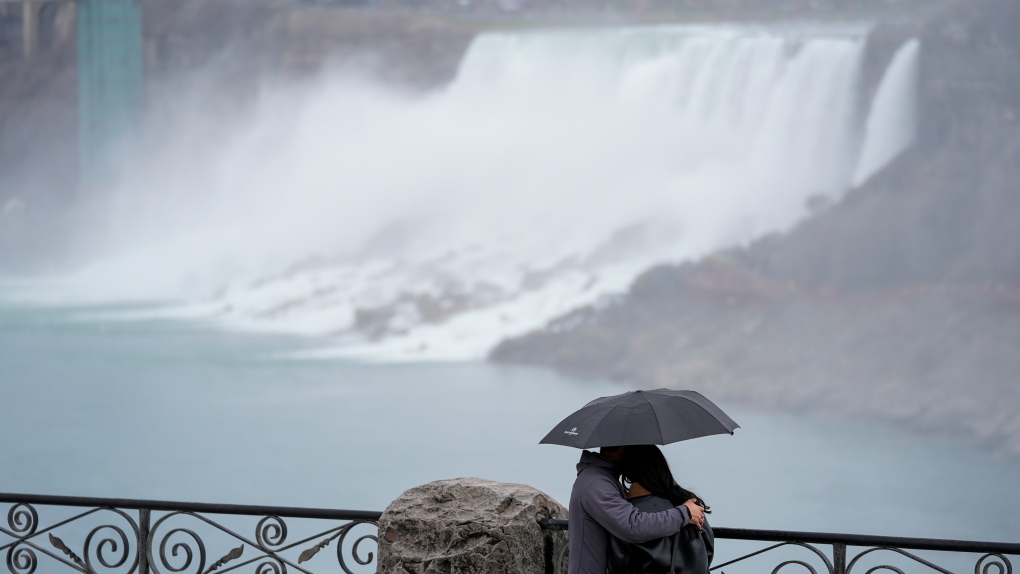Will the weather impact solar eclipse viewing in Toronto?
There’s a chance viewing the solar eclipse in Toronto on Monday could be hampered by cloud cover, but skywatchers should still be able to catch a glimpse of the rare celestial event, if weather permits.
A low-pressure system, the centre of which is moving from the upper Midwest in the United States to northwestern Ontario, will hit the Golden Horseshoe area with clouds and isolated showers from sunrise to late afternoon.
However, according to CP24 Meteorologist Bill Coulter, the forecasting models are “not in total agreement” and there is a chance there will be a few clear breaks by mid-afternoon – right when the solar eclipse is set to take place.
“In other words, we could get lucky. But, anticipate mainly cloudy skies at eclipse time for Toronto and Niagara. I’m keeping my fingers crossed,” Coulter said.
If it is cloudy, astronomers say, you should still be able to experience some of the effects of the eclipse, including the gradual reduction of daylight and change in temperature, as long as you are in a location along the so-called path of totality, like Niagara Falls.
 People gather under overcast skies ahead of a total solar eclipse in Niagara Falls, Ontario, Monday, April 8, 2024. (AP Photo/Matt Rourke)
People gather under overcast skies ahead of a total solar eclipse in Niagara Falls, Ontario, Monday, April 8, 2024. (AP Photo/Matt Rourke)
The effects will be less pronounced in Toronto, which is not in the path and will see 99.9 per cent eclipse coverage, even without clouds in the forecast. In fact, some astronomers have said people in Toronto may not even notice anything is happening when the event takes place.
In an update Monday, Environment Canada published satellite images of the current cloud coverage over Toronto and the Niagara Region.
It appears to show a batch of clouds moving in a north-easterly direction followed by a clearing, which could make for optimal viewing conditions just as the eclipse peaks.
In Niagara Falls, which has been listed as one of the best places to see the moon cross in front of the sun, the eclipse starts at 2:04 p.m., peaks at 3:20 p.m. and ends at 4:31 p.m.
In Toronto the eclipse is set to peak at 3:19 p.m.
CTVNews.ca Top Stories

BREAKING Speaker kicks Poilievre out of Commons over unparliamentary comments
Speaker Greg Fergus kicked Conservative Leader Pierre Poilievre out of the House of Commons during question period today.
Man dies after suffering cardiac arrest while waiting in ER, widow wants investigation
When an ambulance took David Lippert to the hospital in March of 2023, the 68-year-old Kitchener, Ont., executive was hoping to find out why he was feeling weak and unable to walk. Some 24 hours later, he was found unresponsive in the ER.
Baby, grandparents among 4 people killed in wrong-way police chase on Ontario's Hwy. 401
A police chase which started with a liquor store robbery in Bowmanville Monday night ended in tragedy some 20 minutes later when a suspect fleeing police entered Highway 401 in the wrong direction and caused a pileup which killed an infant and the child's grandparents, as well as the suspect, investigators say.
Freeland previews omnibus budget bill, proposed capital gains tax change left out
Deputy Prime Minister and Finance Minister Chrystia Freeland will be tabling yet another omnibus bill to pass a sweeping range of measures promised in her April 16 federal budget, though left out of the legislation will be the government's proposed capital gains tax change.
Air Canada walks back new seat selection policy change after backlash
Air Canada has paused a new seat selection fee for travellers booked on the lowest fares just days after implementing it.
McGill requests 'police assistance' over pro-Palestinian encampment
McGill University says it has 'requested police assistance' about the pro-Palestinian encampment on its lower field.
Judge raises threat of jail in hush money trial as he holds Trump in contempt, fines him US$9,000
Donald Trump was held in contempt of court Tuesday and fined US$9,000 for repeatedly violating a gag order that barred him from making public statements about witnesses, jurors and some others connected to his New York hush money case. And if he does it again, the judge warned, he could be jailed.
Court upholds Milwaukee police officer's firing for posting racist memes after Sterling Brown arrest
The Wisconsin Supreme Court ruled Tuesday that a former Milwaukee police officer was properly fired for posting racist memes related to the arrest of an NBA player that triggered a public outcry.
Witness details deadly wrong-way police chase on Ontario's Hwy. 401
A driver who witnessed a wrong-way police pursuit on Highway 401 moments before a fatal crash said he was hoping the chase would have been called off before lives were lost.































